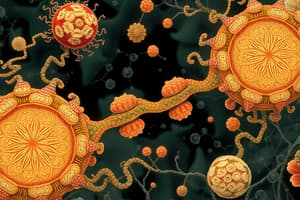Podcast
Questions and Answers
What is microbial metabolism?
What is microbial metabolism?
Microbial metabolism refers to the chemical reactions and transformations of matter carried out by microorganisms.
How does microbial metabolism help maintain Earth's balance?
How does microbial metabolism help maintain Earth's balance?
Microbial metabolism helps maintain Earth's balance by driving the recycling of nutrients and energy.
What practical roles does microbial metabolism play?
What practical roles does microbial metabolism play?
Microbial metabolism is used in industries like agriculture, medicine, and fuels.
How can changing factors like diet impact microbial metabolism?
How can changing factors like diet impact microbial metabolism?
What is an example of how microbial metabolism can convert inorganic compounds?
What is an example of how microbial metabolism can convert inorganic compounds?
Why is microbial metabolism considered malleable?
Why is microbial metabolism considered malleable?
What is bacterial permeation and why is it important in the field of antibiotics?
What is bacterial permeation and why is it important in the field of antibiotics?
What is the role of specific proteins embedded in the cytoplasmic membrane in bacterial permeation?
What is the role of specific proteins embedded in the cytoplasmic membrane in bacterial permeation?
How do drug molecules inhibit bacterial growth once inside the bacterium?
How do drug molecules inhibit bacterial growth once inside the bacterium?
What are the various types of processes involved in microbial metabolism?
What are the various types of processes involved in microbial metabolism?
How is organic matter broken down in microbial metabolism?
How is organic matter broken down in microbial metabolism?
What is the role of photosynthesis in microbial metabolism?
What is the role of photosynthesis in microbial metabolism?
Flashcards are hidden until you start studying
Study Notes
Microbial Metabolism Overview
Microbial metabolism refers to the chemical reactions and transformations of matter carried out by microorganisms—tiny life forms like bacteria, fungi, and archaea. These transformations lie at the heart of biogeochemical cycles, where organic and inorganic materials move through nature's cycle of creation, transformation, and destruction. They help maintain Earth's delicate balance of elements like carbon, hydrogen, oxygen, nitrogen, and others.
Microbial metabolism plays a crucial role in maintaining ecosystems because it drives the recycling of nutrients and energy. Many microbes can break down complex organic material into simpler ones, making nutrients available to plants and other organisms. Some even convert inorganic compounds into organic ones, such as nitrate into ammonia.
From a practical standpoint, microbial metabolism is used extensively in industries like agriculture, medicine, and fuels. Bacteria are developed for producing pharmaceuticals, cheese, wine, beer, and other goods. They're also instrumental in breaking down pollutants and creating fuel alternatives like ethanol.
Moreover, recent research has shown that microbial metabolism is quite malleable; changing factors like diet can lead to alterations in the structure of entire microbial communities. This plasticity enables scientists to engineer new capabilities into microorganisms, potentially leading to improved crop yields, enhanced drug manufacturing, and cleaner environments.
In summary, microbial metabolism is fundamental to understanding and improving our world, whether it's studying how bacteria create biofuels or exploring how they respond to environmental changes. Its dynamic nature means there's always something new to learn, opening doors to innovation and progress.
Studying That Suits You
Use AI to generate personalized quizzes and flashcards to suit your learning preferences.




